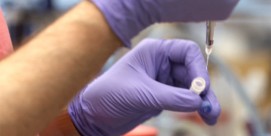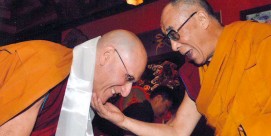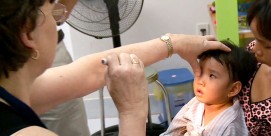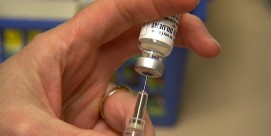In This Episode << SLIDE LEFT TO SEE ADDITIONAL SEGMENTS
Dr. Dennis McCullough
Editor’s note: Dr. McCullough died in Maine on June 3, 2016. He was 72.
Read a Religion & Ethics NewsWeekly e-mail interview with Dr. Dennis McCullough, author of MY MOTHER, YOUR MOTHER: EMBRACING SLOW MEDICINE, THE COMPASSIONATE APPROACH TO CARING FOR YOUR AGING LOVED ONES (HarperCollins, 2008):
Q: Slow Medicine seems to draw on or at least be informed by a range of spiritual values, religious traditions, and philosophies — Buddhism, Christianity, Quaker values, the way you call each stage of old age a “station.” What relationships do you see between religion, spirituality, and Slow Medicine?

Dr. Dennis McCullough |
A: My experience working both here and abroad is that spiritual questions become more regularly addressed closer to death by many, if not most, people. This happens through all the religious avenues you mention. Yet there are deeply spiritual people who are surprised by their responses when facing aging and death. Ram Dass, for example, in a wonderful book and film (“Fierce Grace”) about him, talks of facing his own death and finding that he was reacting in a way he never expected. His thoughts turned to his immediate physical situation and not to his spiritual (Buddhist) practices or spiritual life. John Fanestil, a minister and author of “Mrs. Hunter’s Happy Death,” talks about the need to not have life near its end become so “medicalized” that there is no room or energy for engaging spiritual issues and preparing for death. None of us will really know our reactions until we face this more directly. Slow Medicine says, “Engage these issues earlier and give them more time.”
Q: Your book acknowledges several congregations and ministers and you do some speaking about Slow Medicine in church settings. How have faith communities, members of the clergy, chaplains, religious leaders, and spiritual practices contributed to your experience and understanding of Slow Medicine?
A: I have been a member of faith communities (Lake Wobegon Lutheran, Harvard interdenominational, Quaker, United Church of Christ, Unitarian Universalist) intermittently and find that there is more need for connections between all these faith communities and medical care professionals. We have drifted apart over time, yet our patients benefit from our joint participation in spiritual discussions.
Q: What are your own spiritual practices and traditions, and how do they inform your clinical practices?
A: Over the years I have “worshipped” more and more in the privacy of my garden and with brief meditation time at home. These activities are as close to spiritual practice as I presently get.
Q: How do you compare Slow Medicine and running a “slow code” in a hospital, that is, responding slowly to a patient when a doctor thinks resuscitation is futile? What are the ethical dilemmas, issues, and questions at stake in both practices?
A: I believe that the biggest ethical dilemma relates to medical professionals and institutions truly embracing the practice of supporting the real autonomy that elders desire. It is only superficially encouraged, really. The second and very much related ethical dilemma is how to balance that individual elder autonomy with the family input and involvement, which so often is very great and of great consequence (personal, financial, etc.) for family members. How can all three important parties (elders, family, and health professionals) come together to work through this ethical balancing act? Running a “slow code” is an example of how these dilemmas are handled if the ethical issues aren’t addressed openly.







